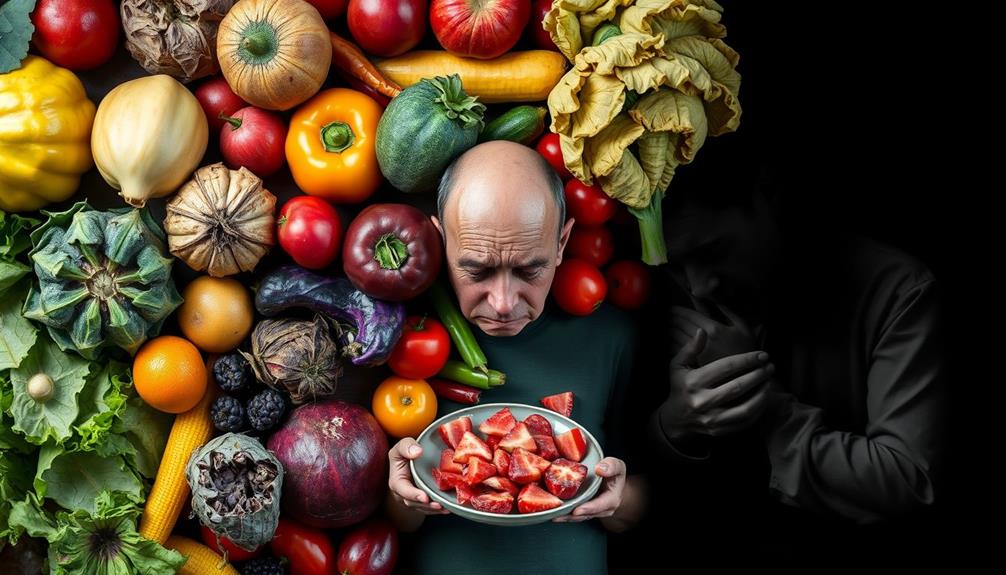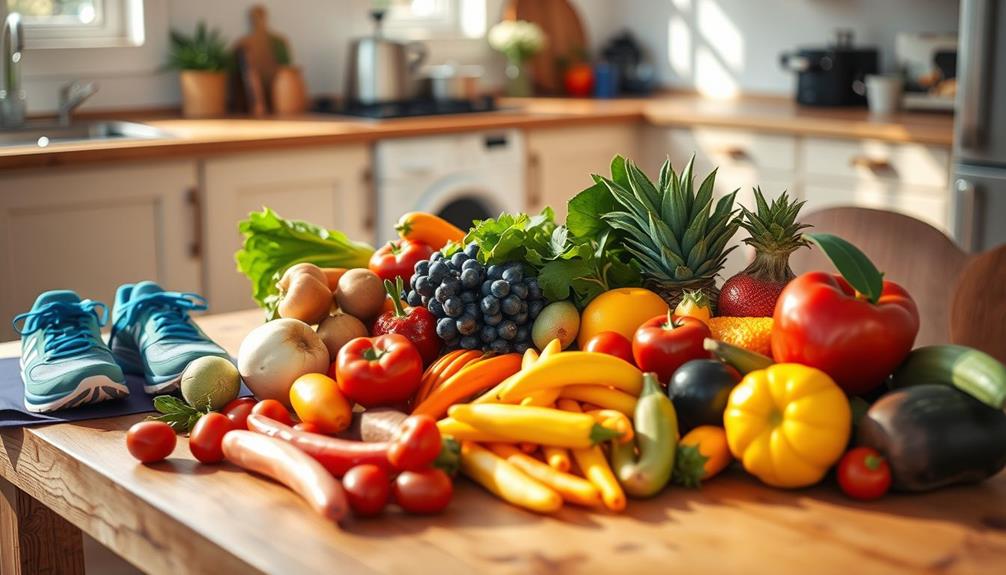The raw food diet can harm your health in several ways. You might experience nutritional deficiencies, especially in vitamin B12, which affects your mood and nerves. While high in fiber, this diet can lead to digestive issues like gas and bloating. You're also at risk of foodborne illnesses from raw animal products and harmful bacteria in sprouts. Plus, limiting variety can sap your protein intake and hurt bone density over time. Mental health can suffer too, as nutritional gaps may lead to mood disorders. Explore these risks further to understand their long-term implications on your well-being.
Key Takeaways
- Raw food diets often lack essential nutrients like vitamin B12, iron, and calcium, leading to deficiencies and associated health risks.
- High fiber content in raw diets can cause digestive issues such as gas, bloating, and cramping, especially during dietary adjustments.
- Consumption of raw animal products increases the risk of foodborne illnesses from pathogens like Salmonella and E. coli.
- Long-term adherence to raw food diets may result in lower bone mineral density, raising the risk of osteoporosis and fractures due to insufficient calcium and vitamin D.
- Nutritional deficiencies in raw food dieters can lead to mood disorders and emotional issues, impacting overall mental health.
Nutritional Deficiencies Overview
When you consider the raw food diet, it's essential to recognize its potential for nutritional deficiencies. Many important nutrients, like vitamin B12, vitamin D, iron, and zinc, are primarily found in animal products. This means that if you follow a raw vegan diet without careful planning, you could be at risk for serious deficiencies.
In fact, about 38% of those on this diet experience vitamin B12 deficiency, which can lead to neurological problems and mood changes. Additionally, some components in raw food, such as oxalates found in foods like raw beets, can cause irritation and further complicate nutrient absorption, making juice diets an important consideration for balance.
Additionally, the absence of nutrients such as calcium and omega-3 fatty acids can weaken your bones and increase cardiovascular health risks. Over-relying on fruits, while often seen as healthy, can lead to dental issues due to high acidity and sugar content, further contributing to nutritional imbalances.
Without proper supplementation and a well-rounded meal plan, the risk of these deficiencies rises considerably. It's important to be aware of these health risks when considering a raw food diet.
If you're serious about this lifestyle, make sure you're supplementing appropriately to avoid these potential pitfalls. Remember, a balanced approach is key to maintaining your health.
Food Safety Risks

The raw food diet isn't just about nutritional choices; it also brings significant food safety risks that you should consider. Consuming raw animal products, like raw eggs and meats, exposes you to foodborne illness risks, with pathogens such as Salmonella and E. coli lurking in these foods.
Additionally, mammography aims to detect breast cancer early for better treatment outcomes, highlighting the importance of preventative measures in health. Sprouts, often included in raw diets, are another concern, as their warm, moist growing conditions can harbor harmful bacteria, leading to outbreaks of food poisoning.
Additionally, unpasteurized dairy products heighten your risk of encountering dangerous bacteria, including Listeria, which can be particularly harmful to vulnerable populations, such as pregnant women and the elderly.
Even certain raw foods, like kidney beans and cassava, contain natural toxins that pose health risks if not properly cooked.
Following a raw food diet, especially one high in raw animal products, can increase your likelihood of foodborne illnesses compared to diets incorporating cooking methods.
It's crucial to weigh these food safety risks against the potential benefits to guarantee you're making the right choices for your health.
Toxic Raw Foods
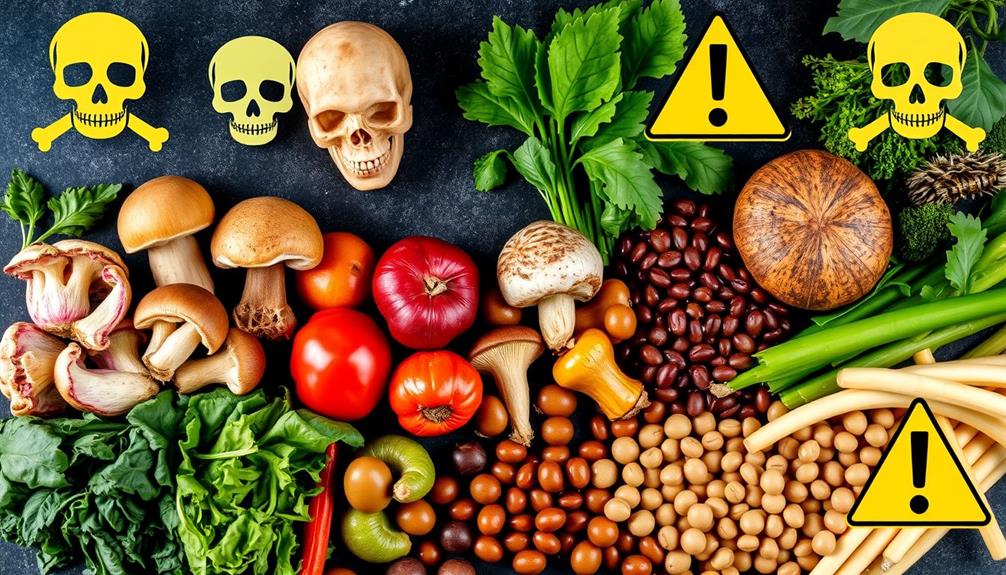
Diving into a raw food diet can expose you to various toxic raw foods that pose significant health risks if not handled properly. Some common culprits include kidney beans and cassava, both of which contain natural toxins that can be harmful when consumed raw.
Here's a quick overview of some toxic raw foods:
| Toxic Raw Food | Risks |
|---|---|
| Kidney Beans | Contains toxins that can be lethal if not cooked. |
| Cassava | Can produce cyanide if eaten raw due to amygdalin. |
| Raw Potatoes | Contains solanine, leading to nausea and headaches. |
Moreover, sprouts like alfalfa and clover can harbor harmful bacteria, increasing the risk of foodborne illnesses. Raw animal products, including eggs and meat, are also risky due to foodborne pathogens like Salmonella and E. coli, which can lead to severe gastrointestinal illnesses.
Awareness of these toxic raw foods is essential for anyone considering a raw food diet. Proper preparation and cooking can help minimize these health risks, ensuring you enjoy the benefits without the dangers.
Digestive Issues
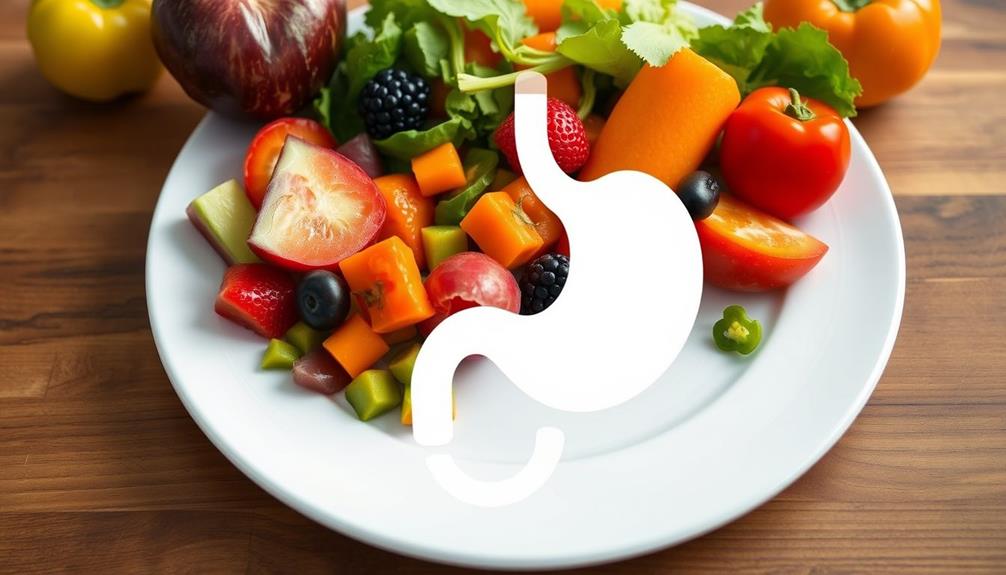
Many people adopting a raw food diet experience digestive issues due to the high fiber content. Your digestive system might struggle to adapt to the sudden influx of raw fruits and vegetables, leading to symptoms like gas, bloating, and cramping.
Additionally, shifting to a raw food diet can be challenging for your body, making it essential to contemplate the importance of selecting the right cold medication if you also experience seasonal colds.
Here are three common digestive issues you might face:
- Temporary Digestive Disturbances: As your gut microbiome adjusts to this fiber-rich diet, you could experience discomfort, including diarrhea or constipation.
- Severe Digestive Discomfort: Certain raw foods, like kidney beans, contain natural toxins that can cause significant digestive issues if not cooked.
- Imbalances in Nutrient Intake: Relying solely on raw foods can limit variety in your diet, potentially leading to nutrient deficiencies that may worsen your digestive problems over time.
While many believe a raw food diet is the key to better health, the reality is that these digestive issues can be quite challenging.
If you find yourself struggling with gas, bloating, or cramping, it might be worth reevaluating your approach to raw foods. Your digestive health is essential, and it's important to listen to your body.
Impact on Bone Health
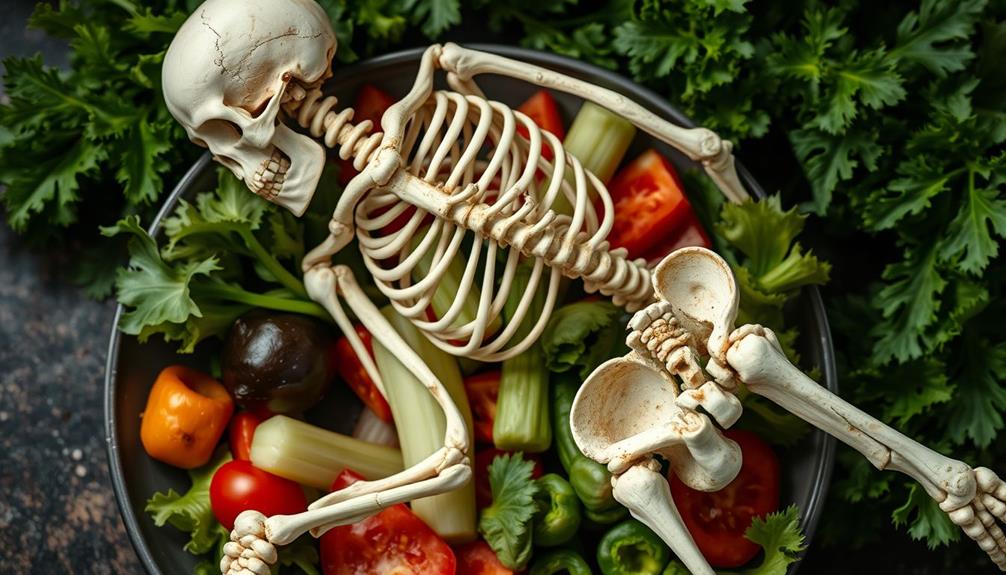
If you're considering a raw food diet, you should be aware of how it could impact your bone health.
Nutrient deficiencies, particularly in calcium and vitamin D, can lead to decreased bone density and a higher risk of osteoporosis.
This diet may also limit your intake of foods that are beneficial for bone strength, such as those rich in balanced diet nutrients.
It's vital to guarantee you're getting enough essential nutrients to maintain strong bones.
Nutrient Deficiencies Risks
Understanding the risks of nutrient deficiencies on bone health is imperative for anyone considering a raw food diet. This diet can lead to significant deficiencies in fundamental nutrients, which may jeopardize your skeletal integrity. For instance, low calcium levels can also impair muscle function, further complicating physical activity and overall health.
Here are three key nutrients that are often lacking:
- Calcium: Important for maintaining bone density, inadequate calcium intake can lead to weakened bones and increased risk of osteoporosis.
- Vitamin D: This vitamin is essential for calcium absorption. Deficiencies can severely compromise your bone health and increase fracture risk.
- Vitamin B12: Common in raw vegan diets, a lack of B12 can elevate homocysteine levels, which is linked to bone loss and reduced bone density.
Additionally, insufficient protein intake, often dropping below 10% of calories in raw food diets, can hinder collagen formation, impacting bone structure and strength.
You mightn't realize it, but these nutrient deficiencies can lead to serious health issues, including osteoporosis. As a result, if you're considering a raw food diet, it's critical to ascertain you're getting enough of these essential nutrients to protect your bones, as well as understanding the importance of maintaining a balanced diet for overall health and well-being, including piercing care and hygiene.
Bone Density Concerns
Bone density concerns are vital when considering the raw food diet, as long-term adherence can lead to significant risks for skeletal health. You may not be getting enough calcium and vitamin D, both essential for maintaining bone mineral density. A study in 2005 found that those on a raw food vegetarian diet had remarkably lower bone mineral density compared to individuals with more varied diets.
Here's a summary of the risks tied to the raw food diet and bone health:
| Risk Factor | Impact on Bone Health | Nutritional Source |
|---|---|---|
| Calcium Deficiency | Decreased bone strength, higher fracture risk | Leafy greens, nuts |
| Vitamin D Deficiency | Impaired calcium absorption | Sun exposure, fortified foods |
| Increased Homocysteine | Higher risk of osteoporosis | Protein sources, grains |
| Impaired Collagen Synthesis | Weaker bones and joints | Animal proteins, cooked vegetables |
Without sufficient caloric and nutrient intake, you might face heightened homocysteine levels, increasing your risk of osteoporosis. Nutritional deficiencies in protein and micronutrients can also impair collagen synthesis, negatively impacting your bone strength and overall skeletal health.
Fertility Concerns

Many women on a raw vegan diet face significant fertility concerns due to menstrual irregularities. In fact, about 70% report these issues, with 33% experiencing amenorrhea, which can severely impact fertility.
This diet often leads to low caloric intake and nutrient deficiencies that compromise reproductive health. Additionally, understanding financial mistakes to avoid can be vital as managing stress related to diet and finances may also affect overall health.
Here are three key risks associated with a raw vegan diet:
- Caloric Deficits: Women may experience caloric deficits of 22-42%, which can suppress reproductive function and increase the risk of infertility.
- Nutrient Deficiencies: Essential vitamins and minerals, like vitamin B12 and calcium, may be lacking, negatively affecting bone health and reproductive hormones.
- Unplanned Weight Loss: This often occurs alongside inadequate nutrient intake, disrupting the menstrual cycle and jeopardizing overall reproductive health.
If you're considering a raw vegan diet, it's vital to understand these fertility concerns. Striking a balance between your dietary choices and ensuring sufficient caloric intake and nutrient density is essential for maintaining your reproductive health.
Ignoring these factors may lead to long-term complications that could affect your ability to conceive.
Mental Health Implications

Frequently, individuals on a raw food diet may not realize the mental health implications tied to their restrictive eating habits. The lack of vital nutrients can lead to significant emotional and psychological issues. For instance, vitamin B12 deficiency is prevalent among raw vegans, with around 38% affected. This deficiency can trigger fatigue, anxiety, and depression, ultimately impacting your overall mental health.
Here's a breakdown of how a raw food diet might affect you:
| Mental Health Aspect | Related Issues | Nutritional Factors |
|---|---|---|
| Emotional Well-being | Mood disorders | Nutritional deficiencies |
| Body Image Issues | Eating disorders | Caloric restrictions |
| Self-esteem | Dental problems due to acidity | Vitamin B12 deficiency |
The restrictive nature of raw vegan diets can also lead to social isolation, limiting your ability to enjoy food-related interactions. Caloric restrictions often result in unintentional weight loss, which may exacerbate body image issues. Additionally, dental problems caused by high-acidity foods can lead to pain and discomfort, further impacting your self-esteem. It is crucial to reflect on these mental health implications before fully committing to such a diet.
Limitations on Food Variety
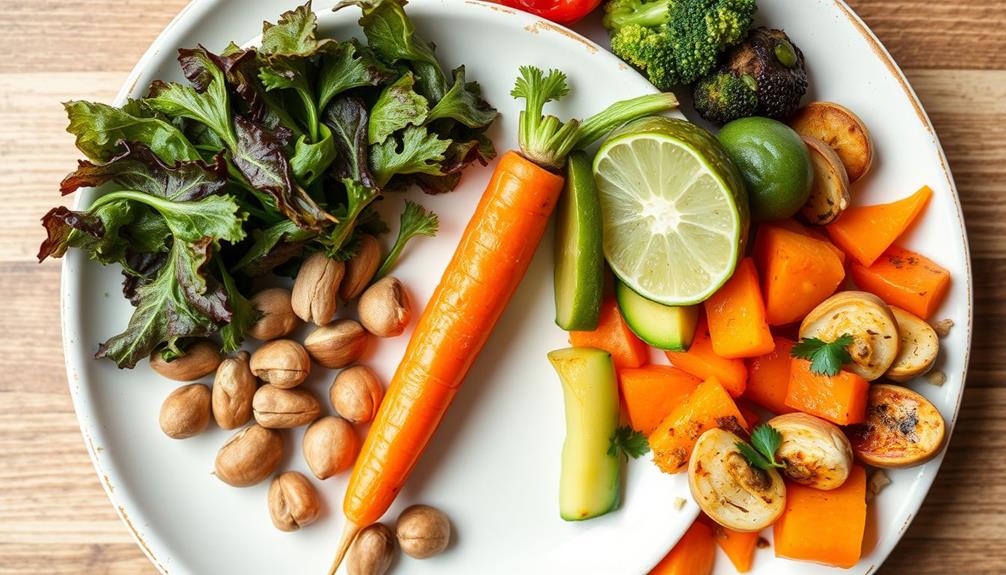
When you adopt a raw food diet, you quickly realize the limitations on food variety can be quite restrictive. This diet primarily focuses on fruits, vegetables, nuts, seeds, and sprouted grains, which can lead to inadequate nutrient diversity.
Individuals with certain psychological conditions, such as BPD, may find it particularly challenging to cope with the emotional fluctuations that a monotonous diet can exacerbate. Here are a few key concerns:
- Protein Needs: Many raw sources don't provide sufficient protein compared to a varied diet that includes cooked foods or animal products.
- Calcium and Iron Intake: Raw plant sources often lack bioavailable forms of these essential minerals, making it harder for you to meet your calcium and iron needs.
- Essential Fatty Acids: The limited options may hinder your intake of omega-3 fatty acids, impacting your heart and brain health negatively.
The lack of food variety can also lead to monotony in your meals. This repetition makes it challenging for you to maintain long-term adherence to the diet due to boredom and dissatisfaction with your food choices.
Cooking Myths and Misconceptions

While a raw food diet may seem appealing for its health benefits, it's important to address some common myths surrounding cooking that can lead to misconceptions about food preparation. Many people believe cooking destroys all nutrients, but this isn't true. Certain cooking methods can actually enhance the bioavailability of nutrients. For instance, cooking tomatoes increases lycopene absorption by over 50%.
In addition, cooking can break down fibers, making minerals like iron and calcium more accessible. Also, cooking with butter adds flavor and moisture to dishes, which can improve the overall nutrient profile of meals.
Raw food advocates often claim that the digestive enzymes in raw foods aid digestion, but human bodies produce their own digestive enzymes, making plant enzymes largely redundant. Additionally, adhering strictly to a raw food diet can lead to nutritional deficiencies since it excludes many nutrient-rich cooked foods essential for overall health.
Historically, no known human culture has thrived solely on raw plant foods, emphasizing the role of cooking in our evolution and dietary practices. Understanding these cooking myths and misconceptions can help you make more informed choices about your diet and the health benefits of both raw and cooked foods.
Long-term Health Effects
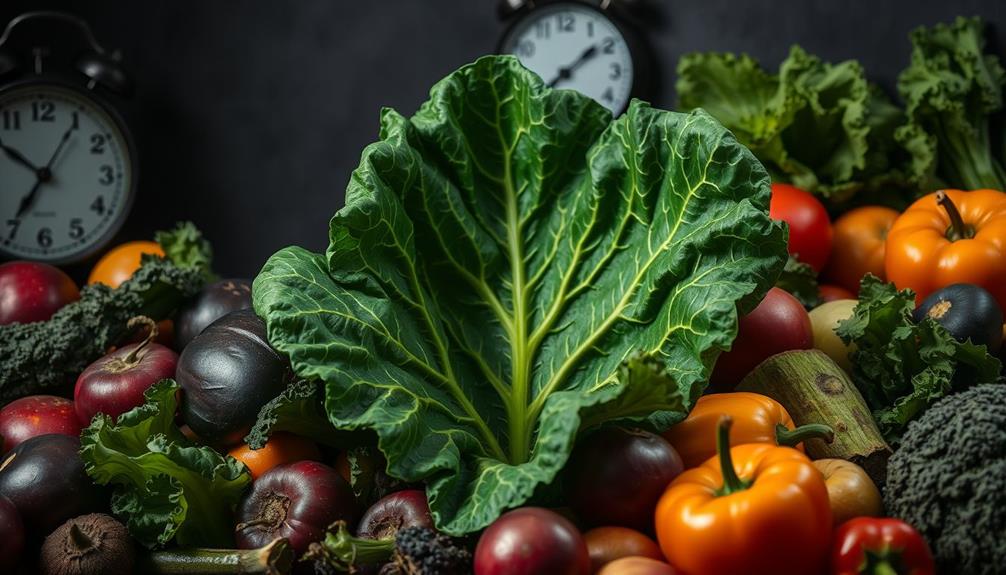
The long-term health effects of a raw food diet can be concerning, especially for those who adhere strictly to its principles. You mightn't realize that sticking to this diet can lead to substantial nutrient deficiencies, affecting various aspects of your health.
Understanding the importance of financial planning for assisted living can also highlight how diet choices may impact overall health and wellness in later years. Here are some potential risks:
- Vitamin B12 Deficiency: About 38% of raw food dieters face this issue, leading to neurological problems and increased cardiovascular risk due to high homocysteine levels.
- Bone Health Issues: Insufficient calcium and vitamin D intake can lower your bone mass, raising the risk of osteoporosis and fractures over time.
- Menstrual Irregularities: Approximately 70% of women on raw vegan diets report menstrual issues, with 33% experiencing amenorrhea, largely due to low caloric intake and nutrient deficiencies.
Additionally, you may encounter chronic digestive issues like gas and cramping, stemming from high fiber content and the difficulty of digesting certain raw foods.
It's essential to weigh these long-term health effects before committing to the raw food diet, as the risks can considerably impact your overall well-being.
Frequently Asked Questions
What Are the Risks of the Raw Food Diet?
The raw food diet poses several risks, including nutrient deficiencies, foodborne illnesses from raw animal products, potential toxins in certain foods, and energy loss due to inadequate caloric intake, which can affect your overall health considerably.
What Are the Dangers of Eating Raw?
You're facing significant dangers when eating raw. Did you know that consuming raw animal products increases your risk of foodborne illnesses, with Salmonella and E. coli lurking? It's essential to take into account these risks for your health.
Why Raw Food Is Not Healthy?
Raw food isn't healthy because it can lead to nutrient deficiencies, digestive issues, and potential foodborne illnesses. You might miss out on essential nutrients that cooking helps make more bioavailable, impacting your overall well-being.
What Is the Risk Factor in Raw Food?
Raw food diets carry significant risks, like exposure to harmful bacteria and natural toxins. You might face nutritional deficiencies, digestive issues, and long-term health problems, including reproductive challenges that can severely impact your well-being.
Conclusion
In exploring the raw food diet, it's clear that while it may promise health benefits, the risks can outweigh the rewards. Nutritional deficiencies, food safety concerns, and digestive issues can impact your overall well-being. Plus, the limitations on food variety might leave you craving essential nutrients. So, before diving into this trend, it's worth considering the potential long-term effects on your health and happiness. Sometimes, cooking could be the key to revealing better nutrition.

